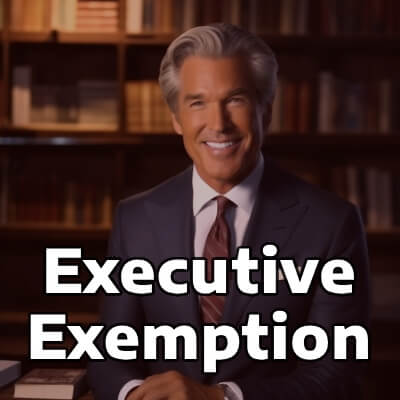There are two types or categories of employees, exempt and non-exempt.
Exempt Employees Defined
The FLSA requires that most employees in the United States be paid at least the federal minimum wage for all hours worked and overtime pay at not less than time and one-half the regular rate of pay for all hours worked over 40 hours in a workweek.
However, Section 13(a)(1) of the FLSA states that certain types of employees are “exempt” from the laws regarding overtime pay and minimum wage and do not have to be paid overtime pay when they work more than 40 hours per week. Some of these types of exempt employees include employees who are bona fide executive, administrative, professional, and outside sales employees. Section 13(a)(1) and Section 13(a)(17) also exempt certain types of computer employees. To qualify for exemption, employees generally must meet certain tests regarding their job duties and be paid on a salary basis at not less than $684* per week. Job titles do not determine exempt status. In order for an exemption to apply, an employee’s specific job duties and salary must meet all the requirements of the Department of Labor’s regulations.
Non-Exempt Employees Defined
Those whose job duties do not fit within any of the exemptions provided for under the FLSA, and are, therefore, entitled to overtime pay.
The exemptions provided for under the Fair Labor Standards Act are very limited and narrow, and the burden is placed on the employer to prove that any given employee or class of employees is not exempt.
While the issue of exemptions can be complicated, the following is a general overview of the primary tests devised by the Department of Labor, and the types of employees that can be considered exempt if all tests are met:
1. Executive Exemption

To qualify for the executive employee exemption, all of the following tests must be met:
- The exempt employee must be compensated on a salary basis (as defined in the regulations) at a rate not less than $684 per week as of 1/1/2020 (previously $455* per week);
- The employee’s primary duty must be managing the enterprise, or managing a customarily recognized department or subdivision of the enterprise;
- The exempt employee must customarily and regularly direct the work of at least two or more other full-time employees or their equivalent; and
- The employee must have the authority to hire or fire other employees, or the employee’s suggestions and recommendations as to the hiring, firing, advancement, promotion or any other change of status of other employees must be given particular weight.
*The Obama Administration’s rules increasing this salary amount to $47,476 did not go into effect on 12/1/16. The Trump Administration has announced the final revised Overtime Rule for salaried employees, which will set the minimum yearly salary for exempt employees at $35,568 or $684 per week as of January 1, 2020. Please see this page for the latest updates.
2. Administrative Exemption

To qualify for the administrative employee exemption, all of the following tests must be met:
- The employee must be compensated on a salary or fee basis (as defined in the regulations) at a rate not less than $684 per week as of 1/1/2020 (previously $455* per week);
- The employee’s primary duty must be the performance of office or non-manual work directly related to the management or general business operations of the employer or the employer’s customers; and
- The employee’s primary duty includes the exercise of discretion and independent judgment with respect to matters of significance.
*The Obama Administration’s rules increasing this salary amount to $47,476 did not go into effect on 12/1/16. The Trump Administration has announced the final revised Overtime Rule for salaried employees, which will set the minimum yearly salary for exempt employees at $35,568 or $684 per week as of January 1, 2020. Please see this page for the latest updates.
3. Professional Exemption

To qualify for the learned professional employee exemption, all of the following tests must be met:
- The exempt employee must be compensated on a salary or fee basis (as defined in the regulations) at a rate not less than $684 per week as of 1/1/2020 (previously $455* per week);
- The employee’s primary duty must be the performance of work requiring advanced knowledge, defined as work that is predominantly intellectual in character and which includes work requiring the consistent exercise of discretion and judgment;
- The advanced knowledge must be in a field of science or learning; and
- The advanced knowledge must be customarily acquired by a prolonged course of specialized intellectual instruction.
To qualify for the creative professional employee exemption, all of the following tests must be met:
- The employee must be compensated on a salary or fee basis (as defined in the regulations) at a rate not less than $455* per week;
- The employee’s primary duty must be the performance of work requiring invention, imagination, originality or talent in a recognized field of artistic or creative endeavor.
*The Obama Administration’s rules increasing this salary amount to $47,476 did not go into effect on 12/1/16. The Trump Administration has announced the final revised Overtime Rule for salaried employees, which will set the minimum yearly salary for exempt employees at $35,568 or $684 per week as of January 1, 2020. Please see this page for the latest updates.
4. Computer Employee Exemption

To qualify for the computer employee exemption, the following tests must be met:
- The exempt employee must be compensated either on a salary or fee basis (as defined in the regulations) at a rate not less than $684 per week as of 1/1/2020 (previously $455* per week) or, if compensated on an hourly basis, at a rate not less than $27.63 an hour;
- The employee must be employed as a computer systems analyst, computer programmer, software engineer or other similarly skilled workers in the computer field performing the duties described below;
- The employee’s primary duty must consist of:
- The application of systems analysis techniques and procedures, including consulting with users, to determine hardware, software or system functional specifications;
- The design, development, documentation, analysis, creation, testing or modification of computer systems or programs, including prototypes, based on and related to user or system design specifications;
- The design, documentation, testing, creation or modification of computer programs related to machine operating systems; or
- A combination of the aforementioned duties, the performance of which requires the same level of skills.
*The Obama Administration’s rules increasing this salary amount to $47,476 did not go into effect on 12/1/16. The Trump Administration has announced the final revised Overtime Rule for salaried employees, which will set the minimum yearly salary for exempt employees at $35,568 or $684 per week as of January 1, 2020. Please see this page for the latest updates.
5. Outside Sales Exemption

According to the overtime laws, to qualify for the outside sales employee exemption, all of the following tests must be met:
- The employee’s primary duty must be making sales (as defined in the FLSA), obtaining orders or contracts for services or for the use of facilities for which a consideration will be paid by the client or customer; and
- The employee must be customarily and regularly engaged away from the employer’s place or places of business.
An employee who does not satisfy the requirements of the outside sales exemption may still qualify as an exempt employee under one of the other exemptions allowed by Section 13(a)(1) of the FLSA and the Part 541 regulations if all the criteria for the exemption is met.
6. Highly Compensated Employees

Highly compensated employees performing office or non-manual work and paid total annual compensation of $107,432 (previously $100,000*) or more (which must include at least $684 per week as of 1/1/2020 [previously $455* per week] paid on a salary or fee basis) are exempt from the FLSA if they customarily and regularly perform at least one of the duties of an exempt executive, administrative or professional employee identified in the standard tests for exemption (see above).
*The Obama Administration’s rules increasing this salary amount to $47,476 did not go into effect on 12/1/16. The Trump Administration has announced the final revised Overtime Rule for salaried employees, which will set the minimum yearly salary for exempt employees at $35,568 or $684 per week as of January 1, 2020. Please see this page for the latest updates.
7. Highly Paid Blue Collar Workers – Not Exempt

The exemptions provided for “white collar” employees do not apply to manual laborers or other “blue collar” workers who perform work involving repetitive operations with their hands, physical skill, and energy. It is a common misconception that blue-collar workers can be treated as exempt if they earn over $100,000 per year – this is not correct, unless they meet the requirements of the highly compensated exemption (#6 above).
Non-management employees in production, maintenance, construction, and similar occupations such as carpenters, electricians, mechanics, plumbers, iron workers, craftsmen, operating engineers, longshoremen, construction workers, and laborers are entitled to minimum wage and overtime premium pay under the FLSA and are non-exempt employees, no matter how highly paid they might be.
Collective Bargaining Agreements
The FLSA provides minimum standards that may be exceeded but cannot be waived or reduced. Employers may, on their own initiative or under a collective bargaining agreement, provide a higher wage, shorter workweek, or higher overtime premium to their exempt and non-exempt employees than provided under the FLSA.
*Note: The Department of Labor revised the regulations located at 29 C.F.R. part 541 with an effective date of January 1, 2020. The Wage and Hour Division of the Department of Labor will continue to enforce the 2004 part 541 regulations through December 31, 2019, including the $455 per week standard salary level and $100,000 annual compensation level for Highly Compensated Employees. The final rule is available at: https://www.federalregister.gov/documents/2019/09/27/2019-20353/defining-and-delimiting-the-exemptions-for-executive-administrative-professional-outside-sales-and.